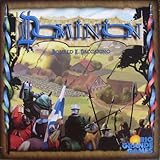Archive

You look at three cards, and get one now, one next turn, and one the turn after that. Put the set-aside cards under Archive. If you play two Archives, they get separate sets of cards.
If you Throne Room an Archive, keep the sets of cards separate; you get one from each each turn. If there are fewer than three cards, just set aside what you can, and Archive will run out of cards faster and still be discarded the turn it has no cards left.
Bustling Village
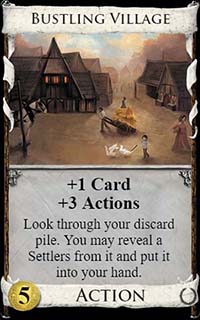
You can look through your discard pile even if you know there are no Settlers in it.
Capital

When you discard this from play (normally, in the Cleanup phase of the turn you played it), you get  , and then get an extra opportunity to pay off
, and then get an extra opportunity to pay off  with coin, right then.
with coin, right then.
You do not get  the if you did not discard it from play - for example, if you trash it due to Counterfeit (from Dominion: Dark Ages). You only get
the if you did not discard it from play - for example, if you trash it due to Counterfeit (from Dominion: Dark Ages). You only get  per copy of Capital discarded; for example if you use Crown to play Capital twice, you still only get
per copy of Capital discarded; for example if you use Crown to play Capital twice, you still only get  when you discard it from play.
when you discard it from play.
Castles
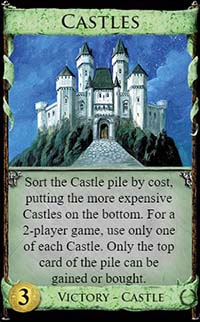
Humble Castle and King's Castle count themselves. Small Castle gains you the top Castle, whichever one that is. Haunted Castle works whether you buy it or gain it some other way, provided that it is your turn. You can pick either option on Sprawling Castle regardless of how many Duchies and Estates are left in the piles. Grand Castle counts both Victory cards in play - such as an Opulent Castle - and Victory cards in your hand.
Catapult
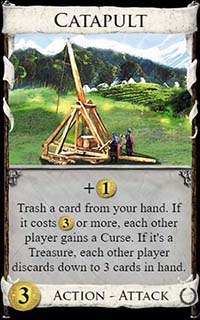
If the card you trash is a treasure, each other player discards down to 3 cards in hand; if the card you trash costs  or more, each other player gains a Curse; if it is both (e.g. Silver), both things happen; if it is neither, neither thing happens. If you have no cards in hand left to trash, neither thing happens.
or more, each other player gains a Curse; if it is both (e.g. Silver), both things happen; if it is neither, neither thing happens. If you have no cards in hand left to trash, neither thing happens.
Chariot Race
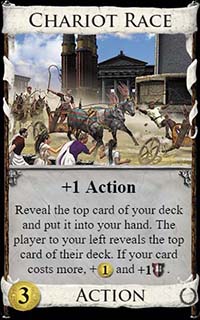
You and the player to your left reveal your top cards; yours goes into your hand, theirs goes back on their deck. If your card cost more you get + and +1
and +1  ; you can put the
; you can put the  token on the Chariot Race to remind you that it made +
token on the Chariot Race to remind you that it made + this turn.
this turn.
If it is a tie, your card did not cost more. With  , your card costs more only if both coin and debt amounts are larger, or one is larger and the other the same. For example Fortune (
, your card costs more only if both coin and debt amounts are larger, or one is larger and the other the same. For example Fortune (
 ) costs more than Overlord (
) costs more than Overlord ( ), but Overlord does not cost more than Silver, and Silver does not cost more than Overlord. If either player has no card to reveal, your card does not cost more.
), but Overlord does not cost more than Silver, and Silver does not cost more than Overlord. If either player has no card to reveal, your card does not cost more.
Charm
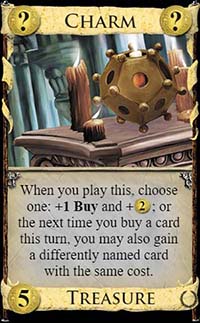
These are cumulative, and each Charm does not have to gain a different card, just a different card from the one bought. For example if you play two Charms and buy a Forum, you could gain two Duchies. The card gained from Charm is gained before gaining the card you bought, which may matter when cards do things when gained.
For example if you buy Villa and gain Rocks via Charm, you will first gain a Silver to your deck due to Rocks, then get +1 Action and return to your Action phase due to Villa.
The costs have to be identical; for example if you play Charm and buy Overlord, you can gain City Quarter, which also costs  , but not Fortune, which costs
, but not Fortune, which costs 
 .
.
City Quarter
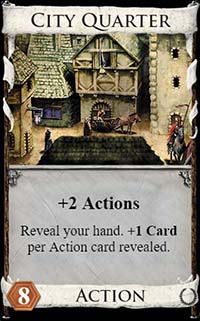
Cards with multiple types that include Action, such as Crown, are Actions.
Crown

If you play this in your Action phase, you play an Action card from your hand, then play the same card again; this does not use up any extra Actions you have.
If you play this in your Buy phase, you play a Treasure from your hand, then play it again; this does not use up any Actions at all. Crown can be used to play another Crown in either your Action or Buy phase, causing you to either play two more Actions twice each, or two more Treasures twice each.
If you play Crown in your Action phase via something that lets you play Treasures (like Storyteller from Dominion: Adventures), Crown will still play an Action card twice.
Emporium
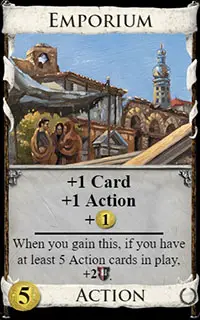
This counts Action cards in play, including Action cards played this turn, Duration cards in play from previous turns, and Reserve cards (from Dominion: Adventures) called into play this turn.
Encampment
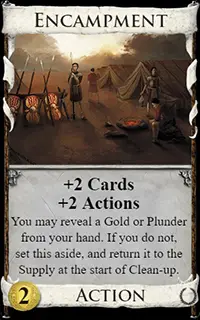
Revealing a Plunder or Gold is optional. When you return Encampment to the Supply, it goes on top of its pile, potentially covering up a Plunder.
Enchantress
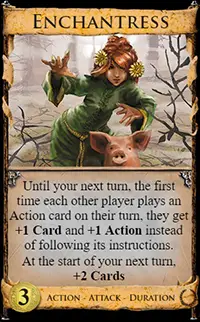
Players revealing a card like Moat when this is played have to do it right then, not later, even though the attack will not hurt them until their turn. The first Action each other player plays, just on their next turn, will give them +1 Card +1 Action instead of what it would have normally done. This does not affect abilities below a dividing line; they still function.
For example a player playing Sacrifice would get +1 Card +1 Action and not do anything Sacrifice normally does; a player playing Groundskeeper would get +1 Card +1 Action and would still get  for gaining Victory cards. It can be helpful to turn the affected card sideways, to remember that it did not do what it normally did.
for gaining Victory cards. It can be helpful to turn the affected card sideways, to remember that it did not do what it normally did.
Enchantress does not affect card abilities from cards played on previous turns; for example if an opponent plays Enchantress and you have an Archive out from a previous turn, on your turn you will first get a card from your Archive as normal, and then the first Action card actually played on that turn will be affected by Enchantress. If Enchantress affects a Crown played in a Buy phase, its player gets +1 Card +1 Action, but has no way to use the +1 Action, since it is their Buy phase (but it might matter e.g. if the player buys Villa).
Engineer

Engineer cannot gain copies of itself, or any other card with  in the cost. When you play it, you gain a card, then may trash Engineer to gain a second card (which can be the same as the first or different).
in the cost. When you play it, you gain a card, then may trash Engineer to gain a second card (which can be the same as the first or different).
Farmers' Market
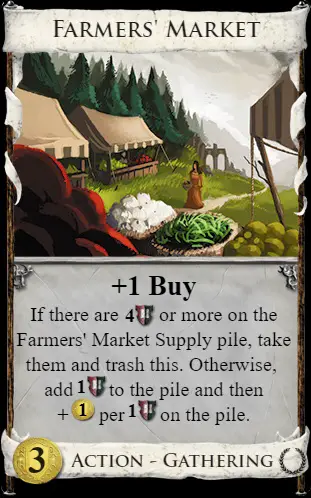
The first time this is played, it produces + (and +1 Buy), the next time +
(and +1 Buy), the next time + , then +
, then + , then +
, then + then the next time the player takes the 4
then the next time the player takes the 4  (and gets no +coin ), then the next time it is back to +
(and gets no +coin ), then the next time it is back to + . This still functions if the Farmers' Market pile is empty.
. This still functions if the Farmers' Market pile is empty.
Fortune

You only double your the first time you play a Fortune in a turn; any further times only get you +1 Buy.
Forum

For example, with 13 coin and only one Buy, you could buy a Forum, getting +1 Buy, then buy a Province.
Gladiator

If there are no Gladiators in the Supply, you cannot trash one, but that does not stop you from getting the + . If you have no cards in hand, the player to your left cannot reveal a copy of the card you revealed, so you will get the +
. If you have no cards in hand, the player to your left cannot reveal a copy of the card you revealed, so you will get the + and trash a Gladiator.
and trash a Gladiator.
Groundskeeper
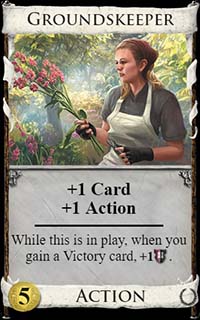
This can trigger multiple times in a turn, for cards gained different ways. For example you could play Groundskeeper, then play Engineer gaining an Estate and taking 1  , then in your Buy phase buy a Duchy taking another +1
, then in your Buy phase buy a Duchy taking another +1  .
.
Multiple Groundskeepers are cumulative. If you Crown a Groundskeeper, there is still just one Groundskeeper in play, so you only get +1  per Victory card gained.
per Victory card gained.
Legionary
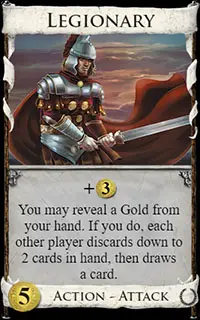
Players wishing to respond to the Attack (e.g. with Moat) must do so before you choose whether or not to reveal a Gold.
You discard both Coppers that were in your hand already, and Coppers drawn in the +5 Cards.
Overlord
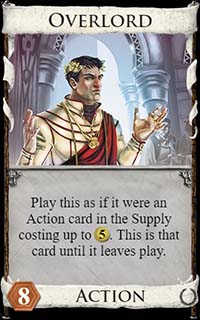
When you play this, you pick an Action card from the Supply that costs up to  , and treat this card as if it were the card you chose. Normally this will just mean that you follow the instructions on the card you picked. For example, with Village in the Supply, you could play Overlord as Village and get +1 Card +2 Actions.
, and treat this card as if it were the card you chose. Normally this will just mean that you follow the instructions on the card you picked. For example, with Village in the Supply, you could play Overlord as Village and get +1 Card +2 Actions.
Overlord also gets the chosen card's cost, name, and types, until it leaves play. If you play Overlord as a card that moves itself somewhere, such as to the trash or the Supply, Overlord will do that; for example Overlord played as Encampment will be set aside and return to the Overlord pile at the start of Clean-up.
If you play Overlord as a Duration card, or as a Throne Room on a Duration card, Overlord will stay in play the same way the Duration card or Throne Room would.
If you play an Overlord multiple times such as via a Throne Room, you will only pick what to play it as the first time; the other times it will be the same thing. Once in play, Overlord is the thing it copied, rather than an Overlord; for example Colonnade will produce  if you buy a copy of that card, but not if you buy an Overlord.
if you buy a copy of that card, but not if you buy an Overlord.
Overlord can only be played as a visible card in the Supply, and the top card of a pile; it cannot be played as a card from an empty pile, or as a card that has not been uncovered from a split pile, or as a card from a split pile that has been bought out, or as a non-Supply card (like Mercenary from Dominion: Dark Ages). Overlord cannot be played as Crown during a Buy phase, since Overlord itself is not a Treasure and so cannot be played in Buy phases.
Patrician
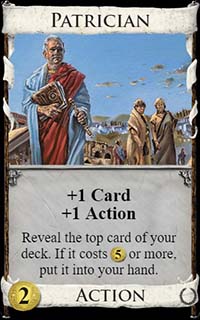
Cards costing  do not cost
do not cost  or more unless they also have a coin cost of
or more unless they also have a coin cost of  or more. So Fortune does but City Quarter does not.
or more. So Fortune does but City Quarter does not.
Plunder
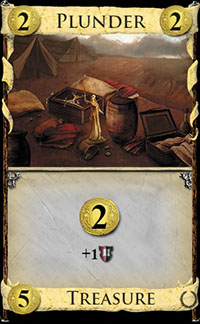
This gives you a  token every time you play it.
token every time you play it.
Rocks

If it is another player's turn, then it is not your Buy phase, so the Silver goes to your hand.
Royal Blacksmith
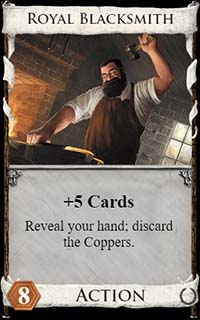
Sacrifice

If you trash a card with multiple types, you get all relevant bonuses; for example if you trash Crown, you get +2 Cards, +2 Actions, and + . If you trash a card with no relevant types (such as Curse), you get nothing.
Settlers
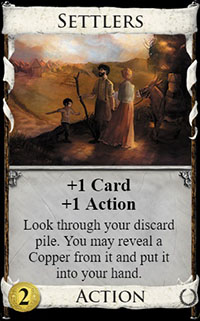
You can look through your discard pile even if you know there is no Copper in it.
Temple

You get +1  , trash 1, 2, or 3 cards with different names from your hand (for example a Copper and an Estate, but not two Coppers), then add 1
, trash 1, 2, or 3 cards with different names from your hand (for example a Copper and an Estate, but not two Coppers), then add 1  (from the supply) to the Temple pile.
(from the supply) to the Temple pile.
Gaining a Temple (whether buying it or otherwise) gives you all the  that has accumulated on the pile. The pile gets
that has accumulated on the pile. The pile gets  even if it is empty; this only matters if there is a way to return a Temple to the pile (like Ambassador from Dominion: Seaside) or a way to gain one from the trash (like Graverobber from Dominion: Dark Ages).
even if it is empty; this only matters if there is a way to return a Temple to the pile (like Ambassador from Dominion: Seaside) or a way to gain one from the trash (like Graverobber from Dominion: Dark Ages).
Villa

If you gain this during your Action phase, such as with Engineer, you will put the Villa into your hand and get +1 Action (letting you, for example, play the Villa). If you gain this during your Buy phase (such as by buying it), you will put the Villa into your hand, get +1 Action, and return to your Action phase.
This will let you play more Action cards (such as the Villa); when you are done with that you will return to your Buy phase, from the beginning - you can play more Treasures (and Arena will trigger again). If you buy Villa, that uses up your default Buy for the turn, however playing Villa will give you +1 Buy and so let you buy another card in your second Buy phase.
If you gain this during another player's turn, you will put the Villa into your hand and get +1 Action, but will have no way to use that Action, since it is not your turn. It is possible to return to your Action phase multiple times in a turn via buying multiple Villas. Returning to your Action phase does not cause "start of turn" abilities to repeat; they only happen at the start of your turn.
Wild Hunt
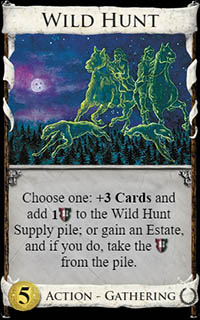
If the Estate pile is empty, you can choose that option but will not get the  tokens. Wild Hunt still functions normally if the Wild Hunt pile is empty.
tokens. Wild Hunt still functions normally if the Wild Hunt pile is empty.
Continue Reading
